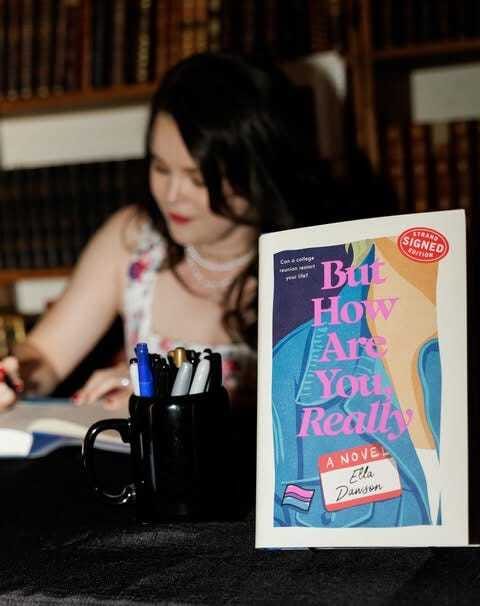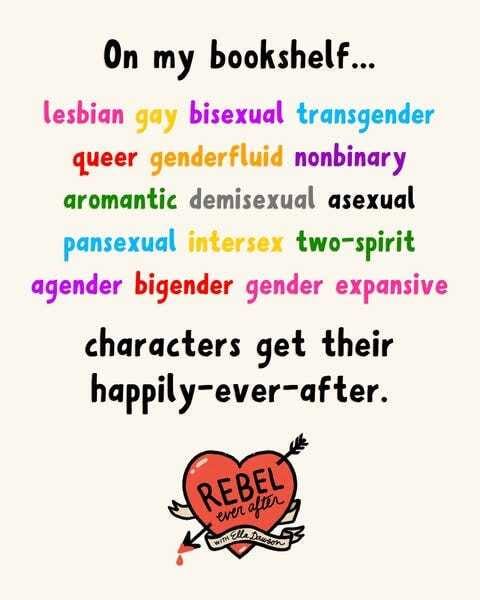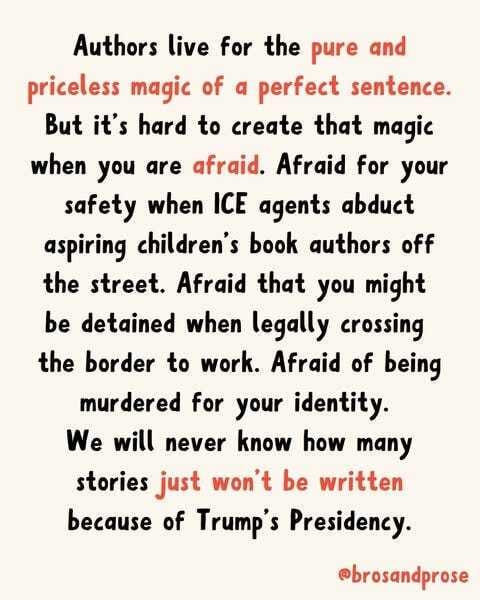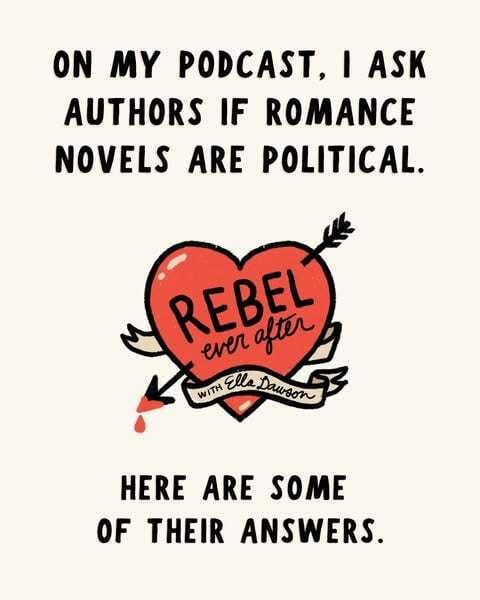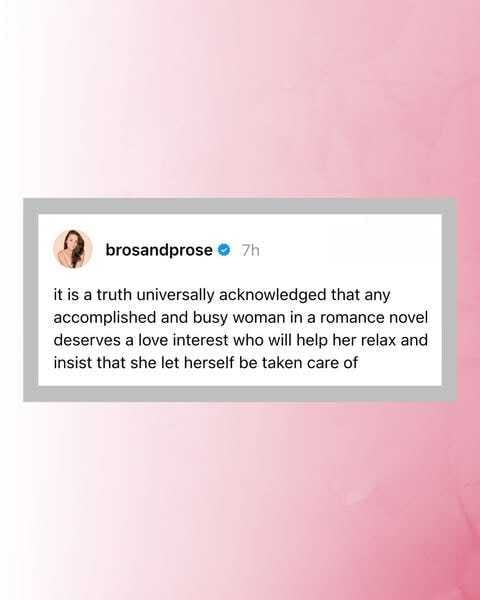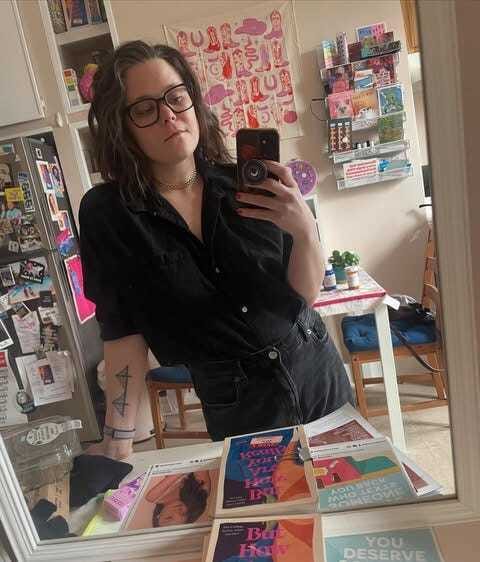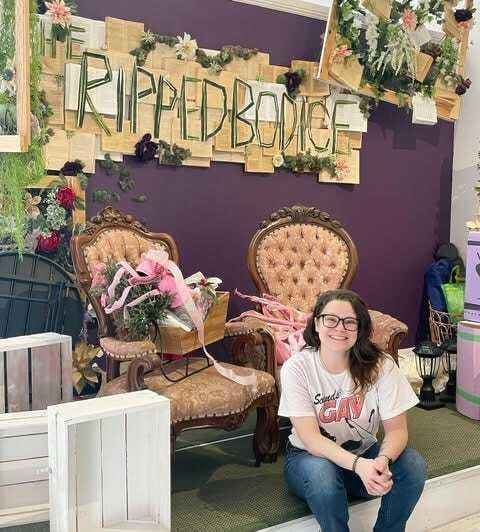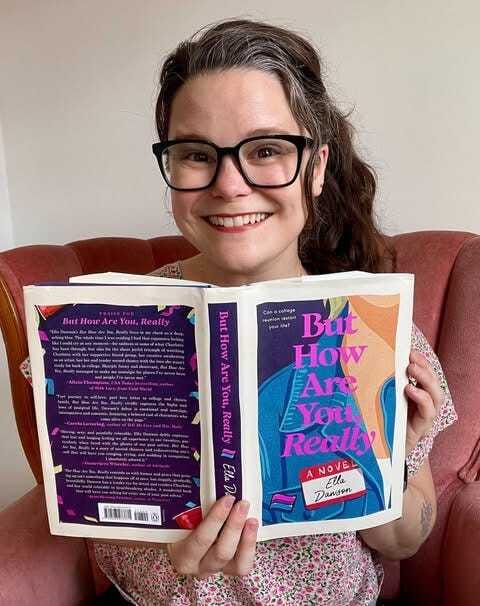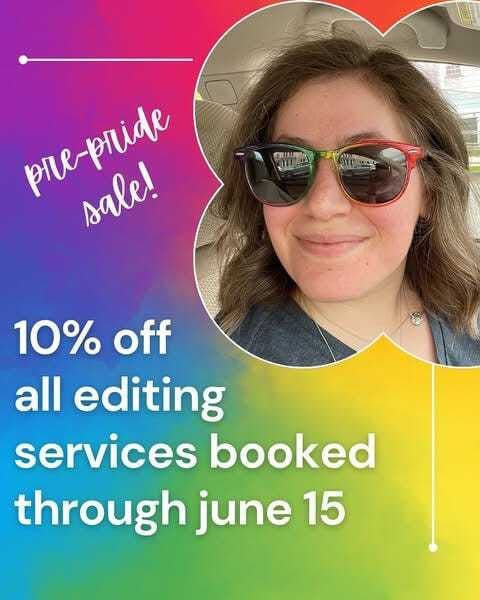- Creativity for Good
- Posts
- romancing progressive politics
romancing progressive politics
creativity q+a with ella dawson
This year, I made a resolution: I was going to stop prioritizing reading books that were just going to make me depressed.
Listen. I’ve read a lot of literary fiction in my time. I love literary fiction. But it is, and I think we just need to own it, an overall bummer of a genre. If you can name me five literary novels that you finished and thought “well, that was a fucking delight, I feel only joy and optimism about the state of the world in general and humanity in particular,” I will a) be shocked and b) immediately demand that reading list, because, dang.
Essay collections, which I also love, tend to be hit-or-miss in this arena — unless they set out explicitly to not be bummers (thank you, Ross Gay, for my life and my mental health), they’re often as emotionally exhausting as they are informative, eye-opening, or worldview-expanding. Ditto poetry, which, again, I love with my entire heart and soul.
(Nonfiction is living in another section of my brain right now. That’s a different newsletter. Check back with me in like, August.)
But around mid-January, when I was staring at my news feed and feeling my will to live seeping out of my pores, I decided that life, at the moment, is too much of a goddamn bummer to also bum myself out by reading things that were just going to depress me further. So I decided to do something I’ve never done before, and started choosing books that would make me happy.
Which is to say: Y’all, I have read a lot of romance novels this year.
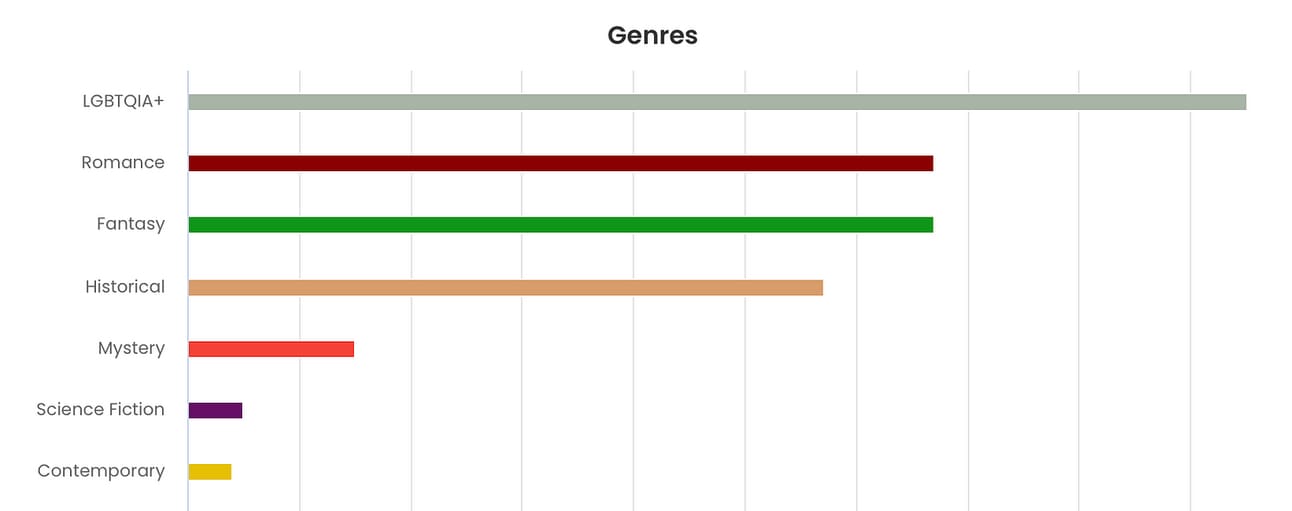
Romance novels get a bad rep. We could talk up and down about why this is (tl;dr it’s mostly sexism) but what I’ve realized in my six months of binge-reading the shit out of every queer romance my Libby account has to offer is that romance is doing just about everything every other genre of fiction is doing — but with more transgressions, more tongue-in-cheek pokes at the status quo, and more determination that there’s nothing so horrible someone can go through that makes them undeserving of a happy ending.
And this isn’t new. Subverting expectations and sneaking a shocking amount of progressive politics into print have been staples of the romance genre for as long as it’s existed.
For my friend Ella Dawson, host of Rebel Ever After, a podcast that explores progressive politics in romance novels, this is exactly what she loves about the genre — and a big part of while she’ll defend it, loudly and proudly, against any and all haters. We sat down to chat romance, politics, the patriarchy, the publishing industry, and the power of a happily-ever-after.
creativity q&a with ella dawson: on romance, politics, and subverting the patriarchy (on purpose)
Tell me a bit about your relationship to creativity. How did you get to be where you are and with what you like to create?
I was a very obsessive reader when I was a little kid. And as an only child, I spent a lot of time alone. Books were very central to how I filled my days. There was a running joke with my parents where they would say, like, "Ella, it's mealtime, put the book down." And so I think from a really early age, I wanted to write. I wanted to express myself in the same way that the authors I loved did. I had those marble composition notebooks and I would just draw squiggly lines, even though I couldn't write proper words yet.
Writing was always something that I did. I can't really separate it from who I am. It wasn't until the last few years that I've even thought of writing as something that I need to practice or be disciplined about because it just came so easily. I didn't even set down to do it, I would just find myself with a piece of paper and start writing a monologue, or a terrible poem. Mostly, it was fiction. Writing fiction was also a way for me to process my feelings, especially romantic feelings. I wrote a lot of thinly veiled fan fiction about my own life, and then some real fan fiction, and it didn't even occur to me that it would be something I could study or do professionally, because it was just a part of who I am and how I express myself. Like, "that can be a job? Surely not!”
It's funny, actually. Whenever people ask me about my creative practice, or how I became a creative person, I'm like, I don't know, I’ve always been like this!
“First you have to be a very weird child.”
Exactly! I think that because I used to work in the thought leader conference world, I’ve kind of determined that there are kind of two types of writers — there are born writers, who write because they love it, and then there are people who have ideas, and who choose writing as a way to express those ideas. Both of those are valid, but I really fuck with that first group. Those are my people. It feels like making magic. I'm not even a spiritual person, but I'm like...this is a kind of magic.
So you wrote But How Are You, Really? which I adore. It’s a romance, but it’s also about many other things. And as writers, we put so much of ourselves and our values into our books, but then we end up having to pick and choose, because no book ever has room for everything. Can you talk a little bit about your writing and editing process, and how you chose what was most important for you to get into the book and the story?
I feel like the first few drafts were me working through a bunch of feelings that I had — about my life and the challenges that I was facing, whether that was as a bisexual person, as a worker in capitalism, as a survivor of a relationship that I hadn't yet realized was emotionally abusive and controlling. I kind of threw up a bunch of stuff onto the page, and then the editing process felt more like I was excavating some bones, and brushing off dust and being like, “Wait, what's under here?" And through those different layers of revision and creation, I kind of realized, oh, these were the values and ideas that I embedded in here without really planning to. And now I'm going to bring them out and develop them more.
It was not surprising to me that one of the main themes wound up being about how bisexual women experience abuse in all these different institutions, whether it's in relationships, the workplace, or in family dynamics, because those were things I was thinking about. And then I got to explore and expand and say, oh, this is now a theme.
I remember that at one point in the revision process, I got an email from my editor that was like, if there's anything you really want to hit hard as an important theme to you as a writer, this is a good moment in the revision process to go through and make sure it’s there. And there’s this moment where Charlotte, the main character, is at the Acronym House, the program house for students who are LGBTQ, and she's looking at all of the flyers that students have put on the fridge. And that was I kind of put in some of my own hippie tweets. Like, oh, a student would have written this zine where it's like, "treat your casual hookup like a human being," like "have casual sex, not careless sex." And that was a moment where I could be like, I'm gonna explicitly put a thing I believe, and I'm gonna sneak it in there. That was really satisfying.
How did you go from putting the book out to starting the Rebel Ever After podcast?
I found that when I was on my book tour and doing promotion conversations, I didn't get to talk about those themes very much. It was much more about the tropes of the book, or some of the larger themes like queer chosen family, but I very rarely was given a soapbox to be like, "let's talk about biphobia in modern romance," or "let's talk about how millennials approach the happily ever after differently because we're all broke and some of us can't afford kids," et cetera.
And I wanted those opportunities! I had thoughts! And I found that the most fulfilling part of publishing in my book was getting to meet other authors who were having those same deep thoughts and who were bucking up against the same conventions and who were also not being given a platform to talk about those things, because book criticism is disappearing in publications. There are so many authors out there that very few of us get to have featured magazine articles, or do longform interviews, or things like that. Like it's very rare for most authors, especially in the genre space, to be asked like, "what is your worldview and purpose and mission with your work" as opposed to, "what are your favorite Taylor Swift songs that relate to your characters?"
Eventually I just thought, if I want to have these conversations and other people wanna have these conversations and I know it's interesting to people who love the genre, whether they're authors or readers or critics, I'm gonna just do it! I'm gonna call up some of the friends that I've made this year and say, “Do you wanna talk at me for an hour about these things we're already talking about off-microphone?" And thankfully, no one has said no. Because authors love talking about this stuff! We do! We love gabbing!
Give us the pitch. What is Rebel Ever After?
Rebel Ever After is a podcast where I interview my favorite romance authors about writing swoony, progressive novels. Each week, I sit down with an author, and we talk about their books, their process, and what makes them decide to write the books they write.
One of the questions I always ask is about what brought them to the romance genre, because there’s still a lot of snobberish disdain for romance. I think it's really interesting how people finally came to it and how they finally thought, “Fuck it, I really want to write these books!" A lot of them are just fascinating people who have other day jobs and bring that background to their books. So "what's your romance origin story” is always a really fun question. And then we’ll talk a lot about the challenges that they face when trying to write books that are deliberately progressive, whether that's writing diverse characters, or homophobia or racism or biphobia or classism, or just dealing with shitty Goodreads reviewers. And when I talk about shitty Goodreads reviewers, it’s not just the Goodreads mobs who will one-star books by black authors because they're racist. There are also Goodreads reviewers who will, without realizing it, bring their own biases into a book and think it's a bad book, when in reality they have a lot of bigotry they need to process, whether it's about mental health or the types of people who wind up in abusive relationships, or trans people, or anything else — there's a lot that you can learn from Goodreads reviewers about how far we still have to go on a lot of issues.
But authors very rarely get an environment where they can talk about that type of thing. So I've tried to create a very good faith, values-driven space where people can say, you know, these are the consequences of writing a progressive book. It's a safe space to say, "I'm not getting the front list treatment from my publisher that I would if I were just writing straight white people on a farm," you know?
Cowboy romance that doesn't actually look at any of the economic realities of being a cowboy. Yes.
Right. But also, like, would your cowboy vote for Trump? We could talk about farmers and cowboys and mental health for a long time, but ain't none of that going to be in the book that publishers want to give a major advance to.
But yeah, that's the type of conversation I want to have. Like, if you do write a book that is about a destitute farmer, are you getting a book box? Probably not.
You touched on this a little bit, but can you talk a little bit about why you decided to focus on authors writing in the romance space specifically, as opposed to just people writing progressive fiction in general?
So, I had originally thought about doing a podcast where I’d just interview my favorite authors about their work, in particular books about feminism and sexuality and gender. And I was just intimidated by the scope of that type of project.
Yeah, that's a lot of people.
It's a lot of people! And I also don't know that I would be the best person to tackle all of the books in the world.
Whereas I think romance, because it's a contained space, it's less intimidating for me. But also, there's so much in there alone. There are so many authors who I could speak to. I have such a long stack of books I want to read. I needed to cut myself off, because even that is a huge project. And also, there are romance podcasts that I love and that I listen to, and there are podcasts that focus on interviewing authors, but I wanted to do something that was deliberately about this political moment as well.
The impetus that really got me off my ass was when Trump won the election the second time. Everyone started screaming about how romance either is inherently political and inherently feminist or that romance should be escapist and apolitical, and everyone was super activated. And I just found it incredibly annoying. I wanted to say, “Fuck it, it is political! Sometimes in bad ways, sometimes in good ways! We should talk about it!” So that's what I did.
I remember a lot of those conversations. There were a lot of demographic similarities in the accounts saying “oh, romance shouldn’t be political.” I think I read a lot of those and was like, “Hm, okay white lady. Pretty sure I know who you voted for."
Yeah, how cute for you.
How cute for you! Truly! Can’t relate.
Oh, those were the days.
What have been some of the highlights of your podcast conversations? Or particularly interesting things you’ve learned?
So many things! For one thing, I was pretty ignorant about the ecosystem of self-published and indie romance and how incredible it is. I think I had absorbed the snobby idea that if a book can't get published, it's just not very good and that self-published books would be of lesser quality. And that was very silly and false. I knew about all of these institutional roadblocks that would prevent books from getting published, but I didn't think about, well, okay, where are those books going and how are people reading them? Because a lot of those authors are paving their own way and carving out different corners for themselves.
And also, a lot of self-published authors are people of color, and Black romance authors especially are doing incredible work in the self-published space. A lot of the successful Black romance authors who we think of as household names now got their start through self-publishing. So, that's been a big unlearning for me — realizing I need to be reading more indie and self-published romance. That is where the genre expanding work is often being done. Those have been some of my favorite guests to speak to because in some ways, I feel like I'm shouting over a fence to my neighbor, like, “What's going on over there?” Because we're thinking about the same things, but we've taken different paths. And the more that I learn about how difficult publishing is and the industry can be, the more appealing the world of indie publishing is to me in terms of the amount of creative control and freedom you get to have. Yes, there are massive trade-offs and financial questions, but it’s still really interesting.
The other one that I'll just say — and this is not news, but it's been shocking to see the extent of it — is the way publishing is moving away from historical romance, which I always considered the backbone of the romance industry. I got my start reading things like Sarah MacLean and Lisa Kleypas and like Eloisa James. Those books brought me into the genre, but I've interviewed so many historical authors who I think of as being titans who have not had their contracts renewed, and are now like, I don't know what to do with my career. I've written all of these books. People love them, but publishing doesn't want me anymore. Do I need to go write a romantasy? Do I need to write about paranormal dukes?
It's been really shocking and sad to me, but also reader interest changes, and genres change. It sounds like younger readers who came into the genre during the pandemic just don't want to read historical. There are a lot of reasons for that, but they still make me sad because I love those books. Those are the books I go to for pleasure reading. I love a duke. I love a butler or a ladies maid who's having their own adventure. I love class analysis in historical. There's just so much there. I could talk about that for a very long time, though, so I'll cut myself off.
I sometimes wonder if maybe part of why the audiences are shifting away from that is younger audiences are like, okay, but those people are all dead now. What about my class consciousness stuff happening now?
That's also true. But also, the class consciousness books aren't coming up in contemporary either. The books that deal with those issues are also not selling well, because they’re progressive and they are not invested in. So I don't know if that's part of it. There's definitely the assumption that like, why would I want to read about history when people didn't have rights and they were miserable? And I'm like, well, yes, that is what the historical romance is subverting.
A lot of historical romance writers have told me that they hear younger readers saying they think reading those books sounds like homework, or that they’ll be boring, or less sexy, or less diverse, which like — many of them are less diverse, but now diverse authors are writing historical, and people don't want to invest in them.
I think a lot of people just really want the pure escapism of, “I want to be in an alternate reality” as opposed to, “I want to be in a different timeline.” And I love that for the fantasy readers! I love that for the romantasy readers! But that's not me. I want a lady's maid. I want corset stays. I want romping through the countryside. I love a road trip in a coach. Like that is what I want. I want them to make out in a coach.
And apparently historical is thriving in self-publishing. People are still writing the books. They're just no longer in mass market paperback. They're in Kindle first.
And many of them are also like Libby, or whatever your library uses. I was so surprised when I started using my library’s ebook collection more often at just how much of a selection of self-published work there was, because it introduced me to some amazing authors I wouldn’t have read otherwise.
Yes. And a big lesson that I learned is you can request your library get stuff if it doesn't happen. And so it may not stock this random self-published book that everyone loves on Goodreads, but you can just ask and they might order it for you. And then you still don't have to pay anything. It's great. Utilize the public library system.
This is a library-friendly newsletter!
Good! Love to hear it.
What kind of feedback have you gotten about the podcast? Not just from people who listen, but also potential guests or people who have been on it?
When I hear back from authors, usually it's, “oh, my God, thank you. I don't get to talk about this kind of thing enough.” And that's what I aim for.
And I try to make it clear to authors, like, if there's something you're dying to talk about, tell me so I can ask you! I love it when someone tells me, “I’ve got this rant that I’ve been saving up that I want to get off my chest.” I’m like, yes! Go forth! Like, if you’re prepared for people to get mad at you, and you're willing to take that hit, I will give you that platform. But most of what I hear from authors is that they're just glad they have the opportunity to go deep into the themes of their work.
I've heard from readers who listen that they’ve used it to discover authors that they either hadn't heard of, and that was amazing. I also recently got my first feedback email from someone who was like, “Can you please put all of the books that are mentioned in the episode in the episode notes?” And I was like, oops, yes, I will do that. But like, Joanna Lowell was my last guest, and she named like 15 books. No one’s taking notes that fast. But that’s part of the goal, to give these books that are really wonderful, that extra love and that extra spotlight.
What’s been the best part of the experience for you?
I mean, it's been so wonderful just being in community with other authors. I've had the opportunity to talk to people who I've considered heroes of mine, whose work I've read for years and years and years. I've had them pitch me, and I'm like, oh my God, yes, of course. Romance overall is such a supportive playing field of equals. I feel like no one is like, “oh, your podcast is too small for me to come.” People are like, “Yeah, I’ll come talk to you for an hour!” I mean, Joanna Shupe talked about the Gilded Age with me! I was like, this is a dream come true, thank you.
On a more personal note, it's been really comforting. I've struggled with a lot of writer's block since my book came out, and just general despair of like, why am I even bothering when the world is so garbage? Hearing from other writers about their careers, or how demoralized they feel right now by the publishing industry — just knowing that we're all having the same feelings has done a lot to lessen my own sense of shame and how hard I am on myself about not writing more.
We're all kind of crashing out right now. This is the era of the crash out. The country's crashing out, the planet's crashing out, authors are crashing out. And that's not a personal failure. That's a normal reaction to the world as it is right now. Of course I'm struggling to write like a happy ever after. Who wouldn’t be?
What would you hope that somebody who's not a romance reader might learn from the podcast?
That romance novels are incredible, and come in many forms. There are the fluffy, beach read, pure escapist, here-for-a-good-time books that are wonderful and important, and should be taken seriously on their own terms, and there are also the meaty, heavily researched, class conscious romances that have footnotes and research notes and come hard for their topics.
There are so many different types of romance novels. And I think there's a romance novel for everyone and for every reader. And romance novels, I think, because they are not taken seriously in so many different ways, have a bit of freedom to be very transgressive and weird and radical, because they slip under the surface, they slip under the radar. So if you want to read about an abortion doctor secretly sneaking around Paris during the World's Fair in 1899, that’s a book! If you want to read about a trans woman who comes back from war and is able to live as herself, and her best friend from childhood is very sad that his buddy died in war but surprise, it's actually me, and now we're in love, that’s a book, too! There's so much going on in romance that is daring as hell.
And honestly, if you want to not take romance seriously, you give us more cover! Like, I wish people weren't so dismissive of romance. But I'm also like, “well, the silver lining is that we're going to do some crazy stuff over here. And if you're not going to take it seriously, that's fine.”
It’s a beautiful Trojan horse. Like, you want to call us monsterfuckers? Sure, but the monster is unionizing their planet.
You're gonna sit there and you're gonna think about the nature of humanity. You're gonna think about what gives someone a soul. And maybe also be horny about it.
Literally yes.
What are you looking forward to with the podcast?
So I’m only interviewing queer authors for Pride Month. Which isn’t much different from a normal month on the podcast, but I was like, I'm gonna be intentional about it. I’ve got four guests, Joanna Lowell, Chip Pons, Tara Tai, and Keah Brown. It’s a great mix of diversity and sub-genres, and I’m just really excited about it. And then beyond that, I have an interview coming up with Olivia Dade, who I adore, about her new book that’s coming out in August, Zomromcom, which is the zombie apocalypse paranormal romance I’ve been waiting for — like, the main character is a 38-year-old soap maker and her love interest is a vampire. It’s like the anti-Twilight because she’s like, “I’m a competent adult and wear coveralls.”
I love the idea of the main character in a zombie apocalypse novel being a soap maker. That's always what I think about whenever there's like a romance plot line in any of those post-apocalyptic shows. I'm like, everybody must be so stinky.
So these are clean characters in a non-derogatory, non-puritanical sense. They smell great.
And it's also just so nice to have a plus-size heroine who gets to eat whatever junk she wants with no shame. There’s a running bit about her vampire lover being so grossed out, but it has nothing to do with fatphobia, it’s just like, “Why are you eating a falafel in a can? Isn’t that preserved food that you put as rations in case of an emergency?” I don't think I've ever read a book about a fat character eats whatever she wants to eat. And like, as a trash eater myself — I eat like a raccoon — I’m like, thank you. I too would be eating hamburger helper out of a can.
Raccoon representation matters too.
Bro, that’s my tagline.
Anything else you want to share?
One thing we talked about earlier was about how to find books to read if they’re not in a bookstore. Discoverability is a huge issue, especially when it comes to diverse and progressive books, because they just don’t get the same treatment as the novels that get the big marketing push and the book boxes and the display at Barnes & Noble. It takes more effort to be intentional and look for books that align with your values and are doing something new and really interesting, and that's part of why I wanted to create the podcast — to elevate these books that I think more readers deserve to find.
It’s also led me to do more intentional discovery on my own, and it’s really been a great experience. Some of the books that I read for the podcast have been pitched to me by publicists who are like “this girl likes the weird books, we're gonna send her the weird books, she's gonna take a chance on this,” and they’re right! I have signed up for so many author newsletters because they will recommend weird books.
So find the method that works for you! Don't just read the books that you see all over your feed. They’re getting enough sales. Treat yourself to a debut author’s weird, progressive book, because they had to work that much harder to get that deal or make that book happen.
Ella Dawson is an NYC-based sex and culture critic and the author of But How Are You, Really, a novel about college reunions and millennial angst. She is also the host of the Rebel Ever After podcast about progressive romance novels. She was once internet famous for having herpes, but that’s a whole other story. Ella is proudly bisexual, anxious, and aspires to adopt a kitten. Follow her on social media as @brosandprose.
updates from shelly
#ICYMI - my editing books are open, and in honor of pride month, I’m offering 10% off on all editorial services if you book anytime between now and June 15!
As an extra bonus, if you’re a Creativity for Good subscriber, you can mention GoodPride15 in your contact form any time between now and June 30, and I’ll give you 15% on any editing package you book over the summer (in June, July, or August).
one more housekeeping note
Between now and the end of June, Creativity for Good will be migrating off of Substack and over to another platform. I have my fingers crossed that there shouldn’t be any disruption to your reading experience, but you may see a different sender in your inbox. See you on the other side, I hope! 💜
resources, links, and further reading
spotlight on: romance and rebellion
read:
listen:
“How readers react when authors talk politics” (Joanna Shupe on Rebel Ever After with Ella Dawson)
“When we’re up against a corner, baby, let’s fight” (Adriana Herrera on the Fated Mates podcast)
donate: Queer Liberation LibraryQueer Liberation Library (QLL) is fighting to build a vibrant, flourishing queer future by connecting LGBTQ+ people with literature, information, and resources that celebrate the unique and empowering diversity of our community.
